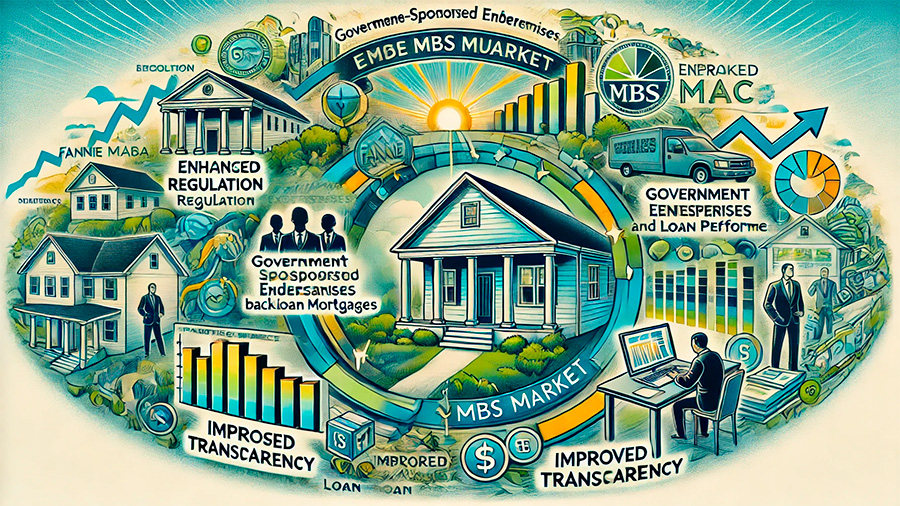Mortgage-Backed Securities (MBS) are financial instruments that bundle home loans into tradable securities, allowing investors to earn returns from the interest payments made by homeowners. Despite their controversial role in the 2008 financial crisis, MBS have remained a staple in the investment landscape, particularly for those seeking stable, long-term income. In 2024, they continue to attract investors due to their potential for steady returns, diversification benefits, and the evolving landscape of mortgage finance. These securities play a vital role in both the housing market and broader financial systems, offering distinct advantages to those willing to understand their complexities.
The demand for MBS is driven by their structured nature and the attractive yields they offer in a low-interest-rate environment. The modern MBS market has undergone regulatory reforms and stricter oversight, making them more transparent and appealing to risk-averse investors.
Why MBS Remain Popular in 2024
In 2024, MBS have re-established their place as a core component of many portfolios, appealing to investors looking for relatively safe, income-generating assets. These securities offer several key benefits, contributing to their continued popularity.
Reliable Income Stream
MBS provide investors with a predictable and stable income stream, which is especially appealing for those seeking fixed-income investments. Since the interest payments on these securities are derived from home mortgage payments, they offer regular cash flow. This consistency makes them an attractive option for retirees, institutional investors, and anyone looking for steady, bond-like returns.
Homeowners continue to make monthly mortgage payments, and those payments fund the returns on MBS. The income from MBS is similar to that from bonds, as they pay interest on a regular schedule. This structured and predictable income stream offers a level of certainty in an unpredictable market, which is especially appealing in a time when interest rates fluctuate and other income sources may be less stable.
Yields Compared to Traditional Bonds
Even in 2024, interest rates remain low by historical standards, and MBS generally offer better yields than traditional government or corporate bonds. This yield advantage makes MBS attractive to income-focused investors who are looking to optimize returns without taking on excessive risk. MBS can provide a relatively higher return for investors who are willing to accept the risks associated with mortgage default or prepayment, both of which are typically mitigated by the large pools of mortgages bundled into the securities.
With traditional bonds offering lower yields in many cases, MBS stand out as a way to earn more robust returns while still benefiting from the safety that comes from their mortgage collateral. Investors who might have otherwise relied on treasuries or corporate bonds often look to MBS as a way to enhance the yield on their fixed-income portfolios.

Evolution of the MBS Market
The MBS market has evolved since the 2008 financial crisis, largely due to enhanced regulation and oversight. These changes have restored confidence in the security and stability of MBS as investments. Today’s MBS are often backed by government-sponsored enterprises (GSEs) such as Fannie Mae and Freddie Mac, which provide an additional layer of security by guaranteeing the underlying mortgages. This government backing has played a significant role in bringing investors back to the MBS market.
Additionally, MBS issued in 2024 come with greater transparency, thanks to improved regulatory frameworks. Investors now have more access to data regarding the underlying mortgages in each security, including details on borrower creditworthiness and loan performance. This transparency allows for more informed investment decisions, helping investors assess the risk associated with each MBS more effectively.
Mitigated Risk Through Diversification
One of the key features of MBS is the way they mitigate risk through diversification. An MBS pools together thousands of individual mortgages into a single security, spreading the risk across numerous borrowers. Even if some homeowners default on their loans, the overall impact on the MBS is typically minimized because of the wide pool of loans.
This diversification reduces the risk for investors compared to owning a single mortgage or investing in individual real estate assets. The large-scale nature of these mortgage pools helps cushion the blow from localized downturns in specific real estate markets or economic slowdowns affecting certain geographic regions.
The Role of Government-Sponsored Enterprises
Government-sponsored enterprises (GSEs) like Fannie Mae, Freddie Mac, and Ginnie Mae play a central role in the MBS market by providing guarantees on many of the mortgage-backed securities issued today. These guarantees ensure that investors receive their principal and interest payments, even if the homeowners default on their mortgages. This backing from GSEs adds a layer of protection, making MBS more attractive to conservative investors who are looking for low-risk, fixed-income investments.
In 2024, the GSE-backed MBS market remains a dominant force, as these securities carry the implicit backing of the U.S. government, offering investors a high degree of confidence in their stability. For investors concerned about credit risk, GSE-backed MBS provide a safer alternative compared to non-agency MBS, which do not carry the same guarantees.

Impact of Prepayment Risk
One of the challenges associated with investing in MBS is prepayment risk, which occurs when homeowners pay off their mortgages early, often due to refinancing when interest rates fall. Prepayment risk can impact the returns on MBS because the principal is returned to investors sooner than expected, often at a time when reinvestment opportunities offer lower yields. However, MBS investors have become more adept at managing prepayment risk, and modern MBS structures often include features that help mitigate this risk.
Despite the potential for prepayment risk, MBS continue to be popular because of the overall stability and income they provide. Investors are able to weigh the potential for prepayment against the higher yields offered by MBS compared to traditional bonds.
Liquidity and Market Access
The MBS market is highly liquid, allowing investors to buy and sell these securities with relative ease. This liquidity is a key factor in the popularity of MBS in 2024, as investors appreciate the ability to enter and exit positions without significant transaction costs. Institutional investors, in particular, value the liquidity of MBS because it allows them to adjust their portfolios quickly in response to changing market conditions.
Moreover, MBS are widely available to individual investors through mutual funds and exchange-traded funds (ETFs). These investment vehicles provide access to diversified pools of MBS, allowing smaller investors to benefit from the returns and diversification advantages of MBS without needing to purchase individual securities.
The Ongoing Demand for Yield
In 2024, the search for yield continues to be a driving force behind the popularity of MBS. With traditional fixed-income investments offering low returns, MBS provide an attractive alternative for investors looking to enhance their income streams. Whether through direct investment in MBS or through MBS-focused funds, investors are drawn to the relatively higher yields and reliable income that MBS can provide.
The demand for yield is particularly strong among institutional investors, such as pension funds and insurance companies, that rely on fixed-income investments to meet their long-term liabilities. For these investors, the stability and income generated by MBS are key components of their portfolio strategies.
Final Thoughts: The Resilience of MBS in 2024
Despite their controversial history, Mortgage-Backed Securities remain a popular and vital part of the investment landscape in 2024. Their ability to provide stable income, higher yields than traditional bonds, and diversification benefits make them attractive to a wide range of investors. Furthermore, regulatory reforms and the backing of government-sponsored enterprises have restored confidence in the MBS market, making these securities a reliable choice for those seeking fixed-income investments. As long as the demand for yield persists and the housing market remains strong, MBS are likely to continue playing a crucial role in portfolios for years to come.




